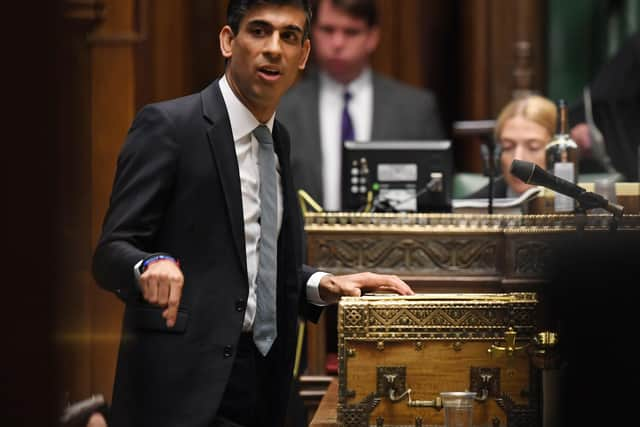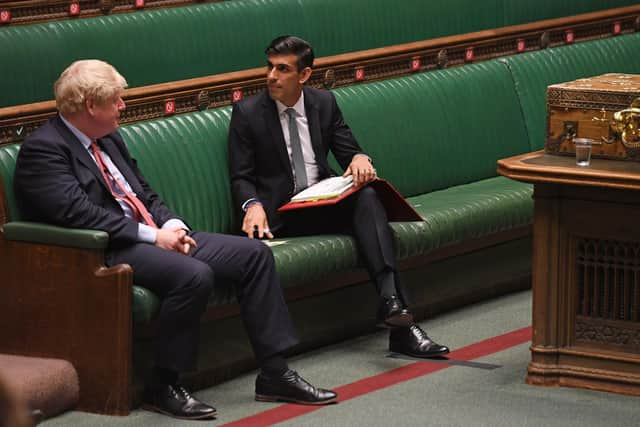Avoiding centralisation and 'mistakes of past' will be key in success of £30bn coronavirus recovery plan in the North
Mr Sunak’s emergency interventions which he outlined in the House of Commons today (Wednesday) have been widely welcomed.
Among the announcements were that firms which have furloughed staff will be given a £1,000 bonus to keep workers in jobs, diners will get a discount to support pubs and restaurants, and stamp duty is to be cut under plans to protect the economy from the coronavirus recession.
Advertisement
Hide AdAdvertisement
Hide AdBut the Chancellor has been warned that he “risks repeating the mistakes of the past - developing and driving the recovery from a desk in Whitehall”.


The Sheffield City Region’s mayor and Labour MP for Barnsley Central, Dan Jarvis, said: “This approach will only take us back to a broken status quo – and hardwire widening regional inequality into our economy.”
He said he wanted to see the Government working with metro mayors and “a radical shift of powers and resources away from Westminster and Whitehall to South Yorkshire and the North, so that through devolution, we create a stronger, greener, fairer economy and society”.
Other measures announced include slashing VAT on food, accommodation and attractions from 20 per cent to five per cent from Wednesday next week until January 12, a tax cut worth up to £4bn and a key ask of a group of Yorkshire MPs. Mr Sunak said the jobs retention bonus could cost up to £9bn if all furloughed workers are retained. It is hoped the East Out to Help Out scheme, where diners can enjoy a 50 per cent discount - up to a maximum of £10 per person - off meals from participating restaurants, will help stimulate the economy.
Advertisement
Hide AdAdvertisement
Hide AdHowever, Marcus Johns, a researcher at the think tank IPPR North, said: “It is disappointing that the Chancellor claims to be ‘doubling down on levelling up’ in this speech, but announces one-size-fits-all national schemes which do not consider the different circumstances of the different communities across the country.”


The think tank’s senior research fellow, Anna Round, added: “The Chancellor’s focus on skills and sectors mean this investment can make a difference in the long-term, as well as in response to the immediate crisis. For maximum impact local leadership is key. That’s how to make the most of the opportunities our regions offer – and to address the local impacts of Covid-19.”
Director of the Northern Powrhouse Partnership Henri Murison added: “There is still a need for a patient capital fund for Northern businesses to grow, and more local investment capabilities for our Metro Mayors to draw on. We will be steadfast on both those fronts alongside accelerating major infrastructure investment – such as HS2 and Northern Powerhouse Rail – in the impending Autumn spending review, because we need an economic stimulus that supports a transition to a fundamentally more-productive economy.”
Speaking in the Commons, Mr Sunak said his plans showed a commitment to “doubling down on our ambition to level up, with better roads, better schools, better hospitals and better high streets, creating jobs in all four corners of the country”.
Advertisement
Hide AdAdvertisement
Hide AdThe MP for Richmond in North Yorkshire said: “Governments, much less people, rarely get to choose the moments that define them. What choice there is comes in how we respond. For me, this has never just been a question of economics, but of values. I believe in the nobility of work. I believe in the inspiring power of opportunity. I believe in the British people’s fortitude and endurance.
“And it is that value, endurance, more than any other that we need to embody now - a patience to live with the uncertainty of the moment and to find that new balance between safety and normality.”
He added: “It is an unambiguous choice to make this moment meaningful for our country in a way that transcends the frustration and loss of recent months.”